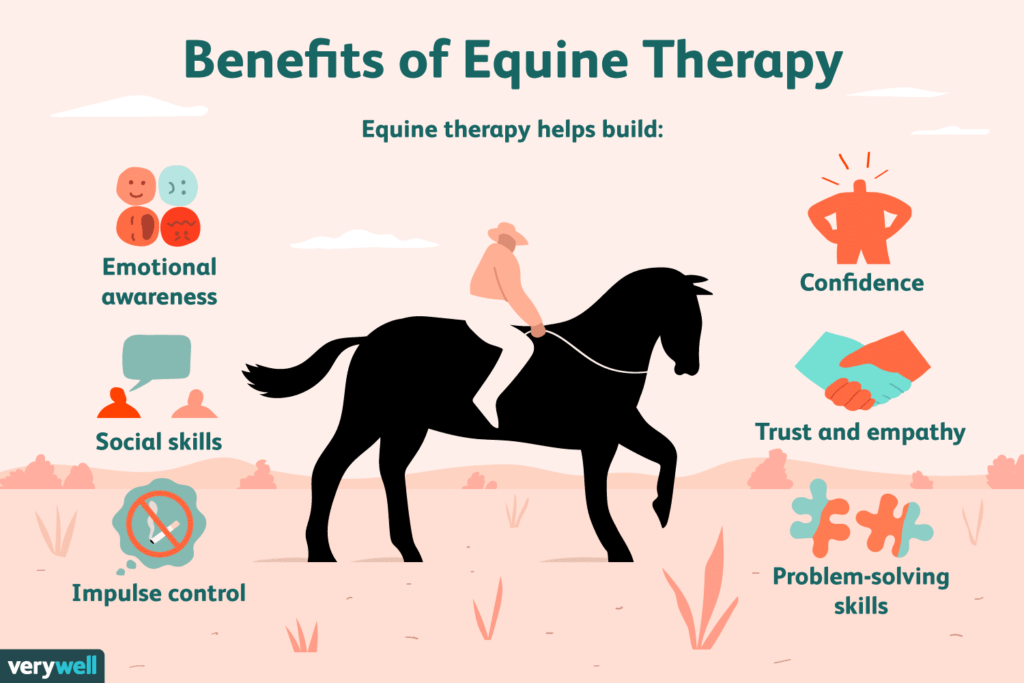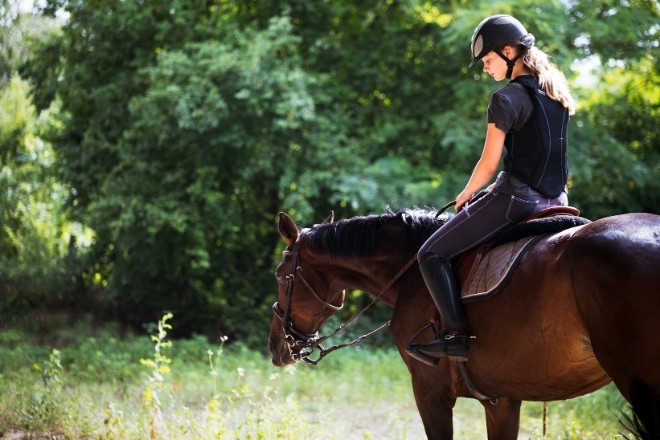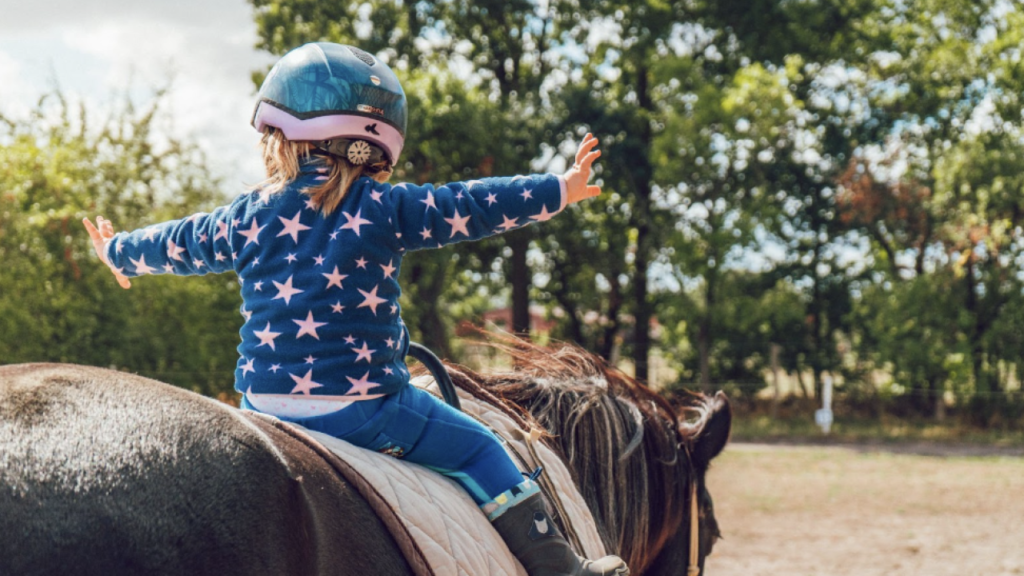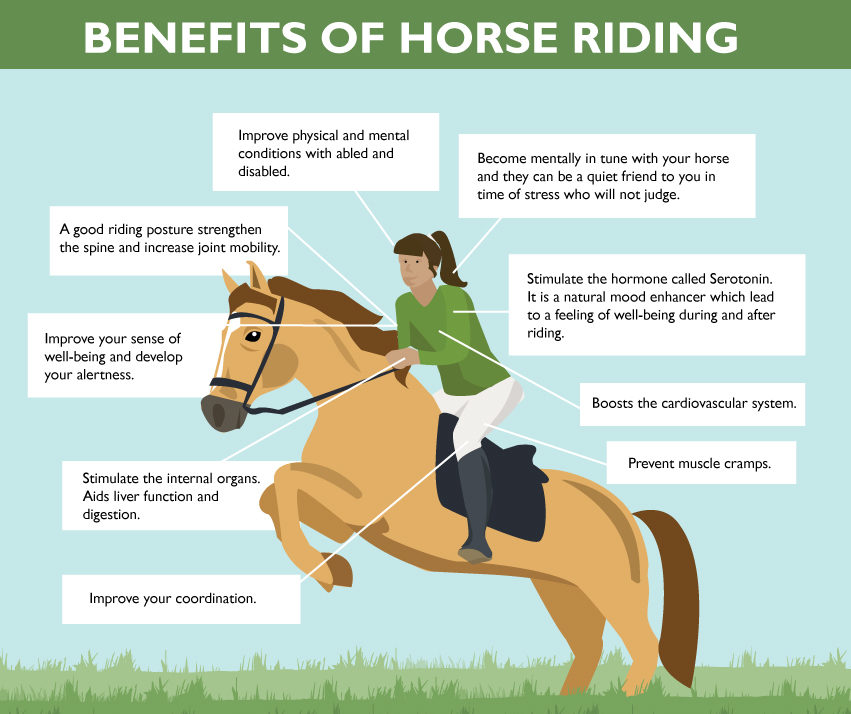Have you ever wondered how horseback riding can positively impact your mental health? It may seem like an unlikely connection, but there’s actually a lot of evidence to support it. In fact, horseback riding has been shown to have a variety of positive effects on our mental well-being. So let’s saddle up and dive into the topic!
When you hop on the back of a horse, something magical happens. The rhythmic motion of the horse’s gait can be incredibly soothing and calming, helping to reduce stress and anxiety. As you ride, you become more in tune with the horse’s movements, which requires focus and concentration. This in turn helps to quiet the mind and promote mindfulness. The connection you develop with the horse can also foster a sense of companionship and trust, which can be incredibly impactful for your emotional well-being.
But that’s not all! Horseback riding also offers a unique form of physical exercise. It engages your core, leg, and back muscles as you balance and stay in sync with the horse’s movements. This physical activity releases endorphins in your brain, which are natural mood boosters. Additionally, being outdoors and surrounded by nature while riding can enhance feelings of relaxation and rejuvenation. So if you’re looking for a fun and therapeutic activity, horseback riding might just be the ticket!
If you want to learn more about the positive effects of horseback riding on mental health, stay tuned for future articles on my website. We’ll delve deeper into the topic and explore how this ancient art form can benefit your mind, body, and soul. So gallop over to “http://horsebackridingdude.com” and get ready to discover the incredible world of horseback riding!
Horseback Riding and its Positive Effects on Mental Health

The Benefits of Horseback Riding on Mental Health
Horseback riding has long been recognized as a recreational activity that offers numerous benefits for physical fitness. However, the positive effects of horseback riding extend beyond the realm of physical well-being, making it a valuable therapeutic tool for enhancing mental health. In this article, we will explore the various ways in which horseback riding can positively impact one’s mental state and overall psychological well-being.
Enhancing Mood and Emotional Well-being
Engaging in horseback riding can significantly improve your mood and emotional well-being. The rhythmic motion of riding, combined with the serene environment and interaction with horses, triggers the release of endorphins in your brain. Endorphins are known as “feel-good” hormones, which can help reduce feelings of sadness, anxiety, and depression. The therapeutic nature of horseback riding allows individuals to find solace and comfort in the presence of these magnificent creatures, which can uplift spirits and bring about a sense of joy and peace.

Decreasing Stress and Anxiety Levels
Modern life can be filled with stress and anxiety, and finding healthy outlets to manage them is crucial for maintaining mental health. Horseback riding offers a unique and effective way to reduce stress levels and ease anxiety. The rhythmic movement of the horse and the connection formed between rider and horse can induce a state of relaxation, similar to the effects of meditation. This calming effect helps lower blood pressure, slow down heart rate, and alleviate the physical symptoms associated with stress and anxiety. As you focus on the present moment and the bond with your horse, worries and anxieties can fade away, allowing you to experience a sense of tranquility and serenity.
Improving Self-esteem and Confidence
For individuals struggling with self-esteem and confidence issues, horseback riding can be a transformative experience. When riding, you take control of a powerful and majestic animal, which requires skill, patience, and trust. As you learn to communicate and establish a connection with your horse, you gradually develop a sense of mastery and accomplishment. Overcoming challenges and mastering new skills in horseback riding can significantly boost your self-esteem and confidence. The feeling of success and achievement gained from conquering fears while riding can translate into other aspects of life, empowering individuals to face challenges with determination and self-assurance.

The Connection Between Horseback Riding and Mental Health
Creating a Bond with the Horse
One of the unique aspects of horseback riding is the deep bond that can be formed between the rider and their horse. Horses are highly empathetic animals, capable of sensing and responding to human emotions. Through regular interaction and care, riders can develop a profound connection with their horses, similar to the bond formed in human relationships. This bond can provide emotional support and companionship, contributing to improved mental well-being.
Developing Trust and Communication Skills
Horseback riding requires clear and effective communication between rider and horse. Horses are perceptive animals that respond to body language, tone of voice, and subtle cues. In order to effectively guide and control the horse, riders must learn to communicate their intentions clearly and assertively. Through the development of trust and effective communication skills, riders not only enhance their horsemanship but also transfer these skills to their interpersonal relationships. The ability to communicate effectively and build trust can greatly improve overall mental well-being, as it fosters healthier connections with others.
Increasing Mindfulness and Presence
Engaging in horseback riding necessitates a state of mindful presence. In order to ride safely and effectively, riders must be fully present and attentive to the horse’s movements and their own body. This focus on the present moment helps to quiet the mind and alleviate racing thoughts. The serenity of the natural environment surrounding horseback riding further enhances mindfulness, ensuring that riders can fully immerse themselves in the experience and find respite from the stresses of everyday life.
Cognitive Benefits of Horseback Riding
Improving Focus and Concentration
Riding a horse requires riders to be fully engaged and focused, as they must anticipate the horse’s actions and respond accordingly. This constant mental stimulation can enhance cognitive abilities, particularly focus and concentration. By consistently practicing and honing their riding skills, riders strengthen their ability to maintain attention and stay focused, skills that can be transferred to other areas of life, such as work or academic pursuits.
Enhancing Problem-solving Skills
Horseback riding often presents riders with unexpected challenges that require quick thinking and problem-solving. Whether it’s navigating obstacles on the trail or adjusting riding techniques to suit the horse’s behavior, riders are constantly required to assess situations and adapt accordingly. This cultivates problem-solving skills and the ability to think on one’s feet, traits that can be valuable in both personal and professional life.
Stimulating Neuroplasticity
Engaging in horseback riding stimulates the brain’s neuroplasticity, the ability of the brain to form new connections and pathways. The complex motor skills and coordination required in riding promote the growth of neurons, enhancing brain function. Regular horseback riding can lead to improved cognitive abilities, such as memory, learning, and spatial awareness.

Physical Health Effects of Horseback Riding on Mental Well-being
Increasing Physical Fitness and Endurance
Horseback riding is a physically demanding activity that engages various muscle groups and promotes overall physical fitness. The rhythmic motion of riding helps improve cardiovascular health, strengthen core muscles, and enhance overall endurance. Regular exercise and physical activity have been proven to have a positive impact on mental health, reducing symptoms of depression and anxiety.
Promoting Balance and Coordination
Maintaining balance and coordination while on horseback is essential to riding effectively. As riders work to maintain their position and adapt to the movements of the horse, they develop a strong sense of balance and coordination. These physical attributes not only contribute to the overall enjoyment of riding but also carry over into daily life, improving coordination and stability.
Relieving Tension and Muscular Aches
Horseback riding can provide relief from tension and muscular aches, which are often associated with stress and anxiety. The rhythmic movement of the horse and the stretching of muscles while riding can help alleviate muscle tension and promote relaxation. Additionally, the act of grooming and caring for a horse can be therapeutic, as it allows individuals to engage in physical activity while focusing on caring for another living being.
Therapeutic Applications of Horseback Riding for Mental Health
Equine-Assisted Therapy for Mental Disorders
Equine-assisted therapy (EAT) is a recognized form of therapy that utilizes horses as co-therapists to facilitate healing and personal growth. EAT has been shown to be effective in treating various mental health disorders, including post-traumatic stress disorder (PTSD), anxiety disorders, and depression. The presence of horses in therapy sessions creates a safe and non-judgmental environment, promoting emotional regulation, improved self-awareness, and the development of healthy coping mechanisms.
Equine-Assisted Activities for Emotional Regulation
Apart from formal therapy sessions, equine-assisted activities (EAA) can also serve as effective tools for emotional regulation. EAA involves various activities, such as grooming, leading, and interacting with horses in a controlled environment. These activities help individuals learn to regulate their emotions, manage stress, and develop healthy coping strategies. The calming and intuitive nature of horses can provide a sense of comfort and emotional support, making EAA beneficial for individuals with emotional challenges.
Hippotherapy for Cognitive and Behavioral Issues
Hippotherapy, a form of therapy that utilizes horseback riding to address cognitive and behavioral issues, has shown promising results in improving motor skills, cognitive function, and communication abilities. The multidimensional movement of the horse stimulates different parts of the brain, promoting neural connections and improving neurological functioning. By engaging in structured riding sessions, individuals with cognitive or behavioral challenges can enhance their overall well-being and quality of life.

The Role of Nature and Outdoor Activities in Mental Health
Benefits of Nature Exposure on Psychological Well-being
Spending time in nature has long been recognized for its positive impact on mental health. Exposure to nature and the outdoors has been linked to reduced stress, improved mood, increased self-esteem, and better overall psychological well-being. Horseback riding provides an excellent opportunity to connect with nature, as riders can enjoy the beauty of natural landscapes while reaping the benefits of physical activity and the therapeutic effects of horse-human interactions.
Therapeutic Benefits of Outdoor Activities
Outdoor activities, such as horseback riding, offer numerous therapeutic benefits for mental health. The combination of physical exercise, fresh air, and exposure to natural surroundings creates a synergistic effect that promotes mental well-being. The serenity and tranquility of the outdoor environment can alleviate anxiety and stress, while the physical engagement provides an outlet for emotional release and rejuvenation.
Comparing Horseback Riding with Other Outdoor Sports
While various outdoor sports and activities offer mental health benefits, horseback riding stands out due to its unique combination of physical exercise, interaction with animals, and immersion in nature. Unlike many other sports, horseback riding requires individuals to develop a deep connection and level of trust with an animal, creating a bond that can have long-lasting positive effects on mental well-being.
Equine-Assisted Interventions and Mental Health
Equine-Assisted Psychotherapy for Trauma Recovery
Equine-assisted psychotherapy (EAP) is a specialized form of therapy that incorporates horses into the therapeutic process to help individuals recover from trauma and emotional distress. The non-judgmental and empathetic nature of horses facilitates healing, enabling individuals to process and release traumatic experiences in a safe environment. EAP has been shown to be effective in addressing emotional and psychological issues related to trauma, helping individuals regain a sense of control, trust, and emotional stability.
Equine-Assisted Learning for Personal Development
Equine-assisted learning (EAL) utilizes horses as teaching partners to foster personal and professional growth. Through experiential activities and interactions with horses, individuals can develop crucial life skills, such as effective communication, leadership, problem-solving, and emotional intelligence. EAL provides a unique and engaging learning environment that promotes self-awareness, self-confidence, and personal empowerment.
Equine-Assisted Activities for Social Integration
Horseback riding and equine-assisted activities can serve as powerful tools for social integration, particularly for individuals with social anxiety or difficulties. Interacting with horses can help individuals build confidence, improve social skills, and foster a sense of belonging within equestrian communities. Horseback riding clubs, events, and competitions provide opportunities for socializing and connecting with like-minded individuals, promoting social integration and a sense of community.
The Psychological Mechanisms Behind the Positive Effects of Horseback Riding
Animal-Assisted Therapy and Human-Animal Bonding
The field of animal-assisted therapy (AAT) recognizes the profound impact that animals can have on human psychological well-being. The presence of animals, particularly horses, can evoke feelings of empathy, trust, and comfort, which can facilitate healing and personal growth. The human-animal bond formed through horseback riding and interactions with horses has been shown to have therapeutic effects, leading to improved mental health outcomes.
Psychological Theories Explaining Horse-Human Interactions
Psychological theories, such as attachment theory and social cognitive theory, offer insights into the mechanisms behind the positive effects of horse-human interactions. Attachment theory suggests that the bond formed between a rider and a horse provides a secure base from which individuals can explore their emotions and overcome challenges. Social cognitive theory proposes that observing and interacting with horses can enhance self-efficacy, improve interpersonal skills, and foster positive behavioral changes. These psychological theories help to explain the transformative power of horseback riding on mental health.
Neurological and Hormonal Effects of Horseback Riding
Engaging in horseback riding can elicit neurological and hormonal changes that contribute to improved mental well-being. Studies have shown that riding can increase the release of oxytocin, a hormone associated with social bonding and stress reduction. The rhythmic movement of riding stimulates the vestibular system and activates various brain regions, including the limbic system, which plays a key role in emotions and memory. These neurological responses, along with the release of stress-relieving hormones, contribute to the positive effects of horseback riding on mental health.
The Social and Community Aspects of Horseback Riding
Building Connections with Other Riders and Horse Enthusiasts
Horseback riding provides a platform for building connections and forming relationships with other riders and horse enthusiasts. Whether it’s joining riding clubs, participating in equestrian events, or simply exploring trails together, the shared passion for horses creates a strong sense of camaraderie and bonding. The equestrian community offers support, encouragement, and an opportunity for meaningful connections, which can enhance social well-being and combat feelings of isolation.
Fostering a Sense of Belonging in Equestrian Communities
Being part of an equestrian community can foster a sense of belonging and identity. The shared experiences and challenges associated with horseback riding create a sense of camaraderie and mutual understanding among riders. Being accepted and recognized within a community that shares your passion can boost self-esteem and overall satisfaction with life, providing a supportive network that enhances mental well-being.
Supportive Networks and Shared Experiences
The horseback riding community offers supportive networks where individuals can share their experiences, seek advice, and find mutual support. Whether it’s dealing with riding-related challenges, overcoming fears, or simply seeking comfort and understanding, the horseback riding community provides a platform for individuals to connect and share their journeys. These shared experiences can validate one’s struggles, offer encouragement, and promote a sense of unity, which can be invaluable in improving mental health.
Considerations and Precautions for Safe Horseback Riding
Proper Equipment and Riding Techniques
Safety is paramount when engaging in horseback riding, and it is vital to invest in proper equipment and adhere to established riding techniques. Wearing a certified riding helmet, appropriate footwear, and fitted riding apparel can help prevent injuries. Learning and practicing proper riding techniques, such as correct posture, hand positioning, and rein control, can ensure a safe and enjoyable riding experience. Riders should also be aware of their skill level and avoid taking unnecessary risks.
Safety Precautions for Beginners and Children
For beginners and children, additional safety precautions should be taken when engaging in horseback riding. It is recommended to receive proper riding lessons from experienced instructors who can teach riding techniques, safety protocols, and horse handling skills. Riding should be initially done under supervision, in controlled environments, and with well-trained horses suitable for beginners. Children should always be supervised by adults to ensure their safety.
Choosing Suitable Horses and Experienced Instructors
Selecting suitable horses and working with experienced instructors play a vital role in safe horseback riding. Horses should be well-trained, calm, and suitable for the rider’s skill level. An experienced instructor can assess riders’ abilities, provide guidance, and ensure safety during riding sessions. It is important to trust and communicate openly with instructors to establish a safe and supportive learning environment.
Promotion and Advocacy of Horseback Riding for Mental Wellness
Raising Awareness of the Therapeutic Benefits
Promoting the therapeutic benefits of horseback riding is crucial to ensure wider access and acceptance of this valuable intervention. Raising awareness through education campaigns, social media platforms, and community events can help dispel misconceptions and highlight the positive impact of horseback riding on mental well-being. By sharing success stories, testimonials, and research findings, more individuals can be encouraged to explore horseback riding as a means to improve their mental health.
Educating the Public and Healthcare Professionals
Educating the public and healthcare professionals about the therapeutic benefits of horseback riding is crucial for incorporating this intervention into mental health treatment. By providing accurate and reliable information, workshops, and training programs, the understanding and acceptance of horseback riding as a therapeutic tool can be expanded. Collaboration between equestrian professionals and mental health professionals can further promote the integration of horseback riding into mental health treatment plans.
Strategies for Accessibility and Inclusion
Efforts should be made to make horseback riding more accessible and inclusive for individuals from diverse backgrounds and abilities. Providing scholarships, financial aid, and access to specially trained horses for individuals with limited resources or physical disabilities can ensure that everyone can experience the mental health benefits of horseback riding. Collaborating with charitable organizations, schools, and community centers can help facilitate inclusive programs and initiatives.
Beyond Recreation: Career Opportunities in Equine-Assisted Therapy
Becoming a Certified Equine Therapist
For individuals passionate about both horses and mental health, a career as a certified equine therapist can be a fulfilling and rewarding path. Becoming a certified equine therapist generally requires completion of specialized training programs, which combine equestrian knowledge with mental health theory and practice. These programs equip individuals with the skills necessary to facilitate equine-assisted therapy and work with clients of various ages and mental health conditions.
Training and Education Requirements
Training and education requirements for equine therapy vary depending on the country and certification body. However, most programs require a background in mental health or counseling, as well as a solid foundation in horsemanship and horse care. Equine therapy training often includes a combination of lectures, hands-on experience, supervised practicum, and an internship or supervised work experience.
Job Opportunities and Professional Development
The field of equine-assisted therapy offers a range of job opportunities for certified equine therapists. Equine therapy centers, rehabilitation facilities, educational institutions, and mental health clinics are just a few examples of potential workplaces. As the understanding and acceptance of equine-assisted therapy grow, so do the career prospects in this field. Continuing education, attending conferences, and joining professional associations can help equine therapists stay updated on advancements in the field and expand their professional network.
Research Findings and Studies on Horseback Riding’s Impact on Mental Health
Scientific Evidence and Studies on Equine-Assisted Therapy
Numerous scientific studies have been conducted to evaluate the efficacy of equine-assisted therapy on mental health. These studies vary in design, including randomized controlled trials, observational studies, and qualitative research. The results consistently demonstrate the positive impact of equine-assisted therapy on various mental health conditions, such as PTSD, depression, anxiety disorders, and eating disorders.
Surveys and Personal Testimonials on Mental Health Benefits
Apart from scientific research, surveys and personal testimonials provide valuable insights into the mental health benefits of horseback riding. Surveys conducted among riders consistently report improved mood, decreased stress levels, increased self-esteem, and enhanced overall well-being. Personal testimonials from individuals who have experienced the therapeutic effects of horseback riding further emphasize the transformative power of this activity on mental health.
Review of Published Research and Academic Articles
Several published research papers and academic articles provide in-depth analysis and review of the scientific literature regarding the impact of horseback riding on mental health. These publications examine the underlying mechanisms, efficacy of different interventions, and population-specific studies. By consulting these sources, a comprehensive overview of the scientific evidence supporting the positive effects of horseback riding on mental health can be obtained.
Conclusion
Horseback riding offers a wealth of benefits for mental health, going beyond its physical fitness advantages. From enhanced emotional well-being and reduced stress levels to improved cognitive function and increased self-esteem, the positive effects of horseback riding are undeniable. The bond formed between rider and horse, the development of trust and communication skills, and the opportunity for mindfulness and presence all contribute to the therapeutic nature of this activity. With its diverse applications in equine-assisted therapy, the social and community aspects it offers, and the positive impact found in scientific research, horseback riding stands as a powerful tool for promoting mental wellness. So, saddle up and embark on this transformative journey towards better mental health.
To explore more about horseback riding and its positive effects on mental health, visit HorsebackRidingDude.com. Our website provides a wealth of information, articles, and resources dedicated to all aspects of horseback riding and its mental health benefits.